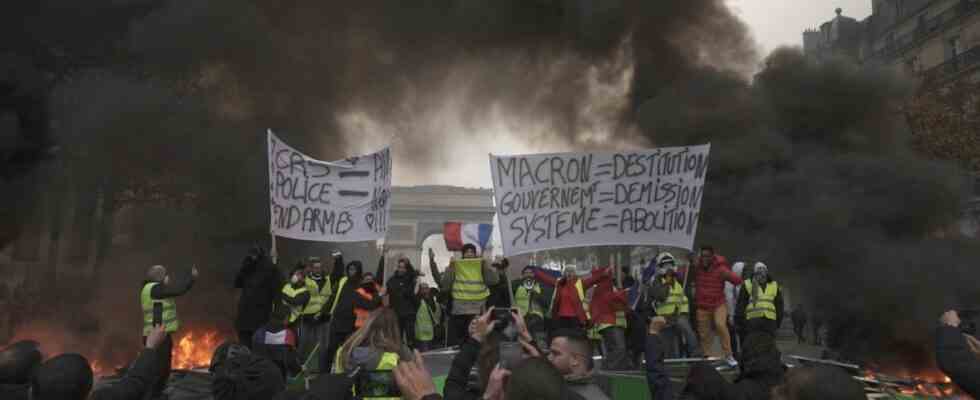Of course, when you think of the interaction between the roundabout and the revolution, you first think of a completely different film. At the beginning of Jean-Marie Straub and Danièle Huillet’s 1981 “Too Soon, Too Late”, a car circles the Place de la Bastille, with its back on the site of the iconic prison demolished by the insurgents before the French Revolution .
In addition, Huillet tells from the off how the lower classes once did the work for the bourgeoisie and made the revolution for them, but also worked on a dream that was denied to them: “égalité” and “fraternité” only existed for them haves; those who had nothing were equal and brotherly alone in their lot of continued exploitation.
Emmanuel Gras’ film “A Revolution – Uprising of the Yellow Vests” or, as it is called in the French original: “A People” seems to pursue the undiminished current consequences of this diagnosis by Straub/Huillet. He accompanies a group of the French protest movement of the “Gilets Jaunes”, the yellow vests, which for several months from November 2018 occupied not only toll booths on motorways but also roundabouts in particular.
There and in the big cities they demonstrated against “those up there”, bourgeois politics, Emmanuel Macron. The starting point was the imposition of an eco-tax on petrol, but soon it was about more, about the poverty of those at the bottom. The writer Edouard Louis, who himself comes from below, summed it up in an existential question that the yellow vests in Gras’ film also ask: “Will I still have money to be able to eat at the end of the month?” The cynicism of the middle-class camp towards this plight becomes clear in a public debate: the government has released ten billion euros, claims a partisan of Macron; an activist calculates that exactly 6.47 euros would end up with her.
If Straub/Huillet started with the car turning around the Bastille with a camera aimed at the roundabout, in Gras a car drives down the various streets of a run-down town while an old chanson is being heard. We are no longer in Paris but in a small provincial town called Chartres. We are not in the center but in the periphery. And we don’t see “the people” or “the revolution”, but only “a revolution”, a part of it and one possibility among many.
What does it mean that there are only white French people here?
The people who live here and go to the demonstrations are ex-alcoholics, ex-homeless, unemployed. Now they are coming out of the shame of poverty, raising their voices. The film is not short of slogans, about the poor and the rich, misery and anger, Macron and his cronies. But what does it mean if there are only white French people here? What about the blacks, the Arabs, the migrants? Is that a coincidence or racism, which the movement has been repeatedly accused of? When signs with “Frexit” are held up, slogans like “France au peuple” are shouted and French flags are waved, how “right” and close to the Front National is it all?
The roundabout ride in Too Early Too Late was radical, essential and poetic, like all of Straub/Huillet’s cinema. A staging of the mechanism of failed revolutions as an eternal return. The dialectic forces of history, bundled in a tracking shot. With Gras’ documentation we have left behind the clear and innovative formal language of the old political cinema, let’s immerse ourselves in the impure political discourses of the present. Hatred of the financial system, neoliberalism and globalization are necessary, but also reversible into resentment. How much does grass want and can show solidarity with those filmed? How “militant” can his film be? Hard to say. In any case, he documents the difficulties of making political films today.
And yet grass always reveals what only a camera can reveal. For example, when he films the slowly escalating escalations between demonstrators and police officers in the streets of Paris, followed by a surreal coffee break: a demonstrator is on the phone, her husband has been injured and taken to the hospital by the police, while the police officers are having breakfast in the background. The disinterested conflict parties can be seen in one shot. So it’s not about individuals, but about underlying structures, a more general dynamic.
This dynamic can be summed up in one word: depression. It is so comprehensive that it takes possession of everything. About the emaciated features, the sick bodies, the campfires on the roundabouts, the pathetic slogans and the tear gas. Populism meets a stubborn, armored state power that rolls over the demonstrators while the Macronists ramble on that 6.47 euros more per capita and month is “something.”
The looming apocalypse is the end of all “politics”, the beginning of a state-administered, repressively pushed through economy of misery. In the end, we witness the disappearance of the movement, seen through the police eye of a surveillance camera high above an unmanned roundabout, where a few charred patches tell of long-extinguished fires.
Un people, F 2022 – director and camera: Emmanuel Gras. Editing: Karen Benainous. Drop-Out Cinema, 104 min. Theatrical release: January 12, 2022.

